13
Followers
4
Following
Paperback Castles
I live on a page in a book. My name is written in a curly and swirly font, along with long descriptions of sleepless nights and filled bookcases.
Currently reading
Swann's Way (In Search of Lost Time, #1)
Swanns verden 2 (På sporet af den tabte tid, #2)
The Essential Rumi
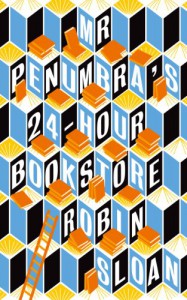 “Walking the stacks in a library, dragging your fingers across the spines -- it's hard not to feel the presence of sleeping spirits.”
“Walking the stacks in a library, dragging your fingers across the spines -- it's hard not to feel the presence of sleeping spirits.”Quirky, geeky and genuinely funny. A mystery of a secret society involving codes, ancient history and books. Endless stacks and piles of books. You could perhaps describe "Mr. Penumbra's 24-hour Bookstore" as a joyous version of "The Da Vinci Code" (with less murder and crime, and more Google and books).
This book will take you on an incredible journey through dimly lit cellar-libraries with dusty books, Google's headquarters with the newest technology, lonely apartments and artsy miniature cities. You will wander through San Francisco, jump on a train and end up in New York. You will meet art students, millionaires, accomplished computer-hackers, marketing and PR-employees and Mr. Penumbra himself.
Mr. Penumbra and his bookstore was always my favorite part of this book; a mysterious man with a friendly voice and filled bookshelves. A seemingly all-knowing middleaged man with a love for books and reading combined with an incredibly rare curiosity for technology. His presence and his philosophies filled the book, and I adored it.
The cute and geeky Cat, the millonaire Neel and the main character, Clay, were lovely additions as well, coloring every page with their own peculiarities and quirks. Their combined abilities and talents allow the plot to come so gracefully together - and underlines the beautiful importance of friendship, which is essential to the book.
Clay is a lovely narrator with his constant sarcasm and many musings on people/marketing/books/technology. His lookout on life is both inspiring and helplessly funny.
“Neel takes a sharp breath and I know exactly what it means. It means: I have waited my whole life to walk through a secret passage built into a bookshelf.”
Perhaps the big mystery wasn't so mysterious after all - the sudden anti-climax was inevitable and the final conclusion was predictable. But it didn't matter to me, because it was so well-crafted and incredibly well-written. The secret society made the characters able to explore the conflict and transition from books to e-readers, from old print to new technology - something we all find relevant and interesting.
The epilogue is one of my favorite parts of this book. Sloan draws the reader in, and paints a complete and vivid picture of every fate and every life represented in the story. With an elegant circular motion the story ends the exact same place it started; with a reader holding a book.
This is a page-turner, and I turned the last page with a soft smile playing on my lips.
“After that, the book will fade, the way all books fade in your mind. But I hope you will remember this:
A man walking fast down a dark lonely street. Quick steps and hard breathing, all wonder and need. A bell above a door and the tinkle it makes. A clerk and a ladder and warm golden light, and then: the right book exactly, at exactly the right time.”
 This is an intricate and complex study of the slightly tilting power balance in a crumbling marriage. It is all about being in control, fulfilling needs and being wanted. Imogen is always striving for Evelyn's attention and an acknowledge of her abilities as a wife. She needs to be constantly reassured and comforted in order to function as a wife, as a mother and as a human being.
This is an intricate and complex study of the slightly tilting power balance in a crumbling marriage. It is all about being in control, fulfilling needs and being wanted. Imogen is always striving for Evelyn's attention and an acknowledge of her abilities as a wife. She needs to be constantly reassured and comforted in order to function as a wife, as a mother and as a human being. Blanche Silcox, on the other hand, is an independent woman, a magnetic force, a solid mother figure, that lures Evelyn in with her ease and wit. The graceful Imogen must witness her faithless husband turn to an unattractive older woman - and she learns that good looks doesn't guarantee any safety at all. A woman who she has never even considered as a treat turns her safe marriage routine upside-down.
Does that make Imogen the hare, then? So it would seem, as she watches Blanche race by her and ultimately win the race. But who wins the long run? Blanche might gain a husband - but an unfaithful one, and Imogen might be alone, but she will learn to be independent. Jenkins seems to be playing with role reversal - she leaves her question mark unanswered, and the reader is left with an unmistakable sense of duality.
Jenkins writes beautifully, but rather slow as well. It took me a while to get into this book, as it mostly consists of suspicions and the trivial events of a simple everyday life. While I understand the psychological value in Jenkins' simple observations, they do not always make the best of reading material.
This is an interesting book - but not an absorbing one.
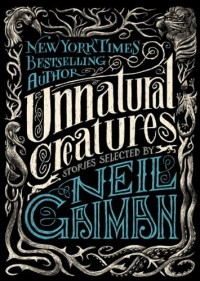 This anthology holds 16 peculiar and haunting tales of unicorns, griffins, werewolves, deathly plants and the graceful Lady Death herself. Each story is carefully selected and introduced by Neil Gaiman, and he has made a beautiful contribution as well.
This anthology holds 16 peculiar and haunting tales of unicorns, griffins, werewolves, deathly plants and the graceful Lady Death herself. Each story is carefully selected and introduced by Neil Gaiman, and he has made a beautiful contribution as well. These 16 stories are very different and range from the eerie and mysterious to the adoring and wise, and comical and ironic. A strong friendshipbond between a griffin and a minor canon won my heart, and a tale of a snake-speaking girl's sacrifice and doubt fascinated me - but it was the story of a time-traveler and a unicorn that made me sure: this is a wonderful book.
While some stories aren't as great as others, they all seem connected to each other with their themes and dark tones of oddities. Gaiman's museum of unnatural creatures is a mesmerizing place to explore and to get lost in. I opened the book - and I entered a world of imagination. The unnatural ended up becoming something quite natural, in the end.
Swanns verden 1 (På sporet af den tabte tid, #1)
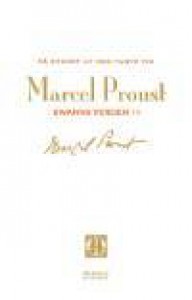 “If a little dreaming is dangerous, the cure for it is not to dream less, but to dream more, to dream all the time.”
“If a little dreaming is dangerous, the cure for it is not to dream less, but to dream more, to dream all the time.”I cannot explain what the plot is in this book. I am not sure if there even is a plot. Instead this is a book of deep thoughts and musings, long and curly sentences and an endless amount of atmospheric and momentarily impressions. Proust is able to stop time and space, to split every second into an eternity and to define every sense jolting through his main character's body. It is beautiful.
A tiny and hesitant bite of a madeleine transports the reader, the author and the main character on an incredible journey; memories come to life, old times become present - and every word is a delicate and tangible part of the experience. The rest of the book is memories boiling up with the steamy scent from a filled teacup.
This book is filled with long and complicated sentences, impossible words and a perfectly disorientated timeline. But every page is a journey, every word is a memory and every single letter is an experience.
 “I'll not listen to reason... reason always means what someone else has got to say.”
“I'll not listen to reason... reason always means what someone else has got to say.”Brilliantly funny. Gaskell's little town of Cranford is both absurd and heartwarming, witty and charming. Gaskell was such a skilled observer, and even now when a hundred years have passed, I can still recognize the dilemmas of gossip, economy and wild fancies. My favorite part of this delicious little novel was when every woman in Cranford suspected robberies and theft in their comfortable homes - and dear Mrs. Forrester scared the life out of everyone by starting to talk about ghosts. I couldn't help but to laugh.
Gaskell is quite genius to make up this entire society of timid women and their small concerns. How one ought to dress, the purchase of a perfect silk gown or the wishful thinking of a fashionable turban instead of a common yellow hat - the little wonders of everyday life fills quite a lot in this book. The constant fear of gentlemen and marriages is so very different from so many other novels at the time where the entire plot revolves around the possibility of a marriage.
In fact, I do not even think "Cranford" has a plot at all. It mostly consists of comical episodes which arranges themselves into vague glimpses of a simple life. Gaskell simply wishes to amuse and to please her reader - and she succeeds gracefully.
 “'No milk,' I said.
“'No milk,' I said. 'No milk,' said my sister.
I watched my dad think about this. He looked like he was going to suggest that we have something for breakfast you do not need milk for, like sausages, but then he looked like he remembered that, without milk, he couldn't have his tea. He had his 'no tea' face on.”
It is a rare thing to actually laugh out loud, when you're reading by yourself. I do not know why, but the act of actually making an unconscious sound when you're completely alone seems impossibly hard. Laughter is perhaps one of those things you should always share with others.
That said, this book made me laugh in spite of myself. I read it in under an hour, and I laughed and giggled the entire time. "Fortunately, the Milk..." is silly, peculiar and a bit absurd. But most of all, it is fun.
While it most certainly is a children's book intended as an endearing goodnight story, it still managed to amuse me as well. In between the sudden appearances of little ponies embellished with pale blue stars, sulky wumpires (one named Edward) and the three dancing dwarfs, I couldn't help falling for this book. Twilight-irony, Doctor Who references and the lightness of the childhood imagination won me over.
Neil Gaiman has used the word 'silly' about this book, and I can find no better word for it. It is silly - filled with a very British silliness, that I adore. You should not read it if you expect to find the wisdom from 'The Graveyard Book" or the atmospheric strangeness from "Coraline". You should however read it, if you want to laugh and if you're still a child at heart. And remember;
“Where there is milk, there is hope.”
 “I sell dreams, small comforts, sweet harmless temptations to bring down a multitude of saints crashing among the hazels and nougatines.”
“I sell dreams, small comforts, sweet harmless temptations to bring down a multitude of saints crashing among the hazels and nougatines.”I opened this book, and I drifted away into a world of senses; a certain prickling on my tongue, a mouthwatering smell in my nose, and the sound of a magical wind of change ringing in my ears. Vivid impressions; rich and dark like the chocolate Viviane makes, drew me into a world of tempting delights and gluttonous cravings. I turned the pages fast, lusting for more, and I fell deeper and deeper in love with Harris' heavenly blend of magic realism and insightful character portraits.
Reading "Chocolat" is an overpowering experience. Harris' uses a breathtaking amount of adjectives, causing the reader to actually live in the novel for a short time. The writing flows gracefully and every word is so impossibly tangible, that you can almost reach out and touch the smooth surface of the melting chocolate.
Some parts of the book almost felt like a fairy-tale with odd elements of wonder and mystique pushing their way into the little village of Lansquenet. The magic is always present, hiding beneath the crumbling surface of the villagers' everydaylife, making everything a bit lovelier.
“Happiness. Simple as a glass of chocolate or tortuous as the heart. Bitter. Sweet. Alive.”
Normally I don't do well with the shifting tones of different narrators - I always end up liking one more than the other, skipping entire chapters to get to the character I like the best. I'm afraid, that I'm not always a very patient reader.
In "Chocolat" however, this was no problem at all. The shift between Vivianes soft voice and Father Reynaud's strict denial resulted in such a strong contrast, and I was interested to read, compare and speculate of their differences. I would never have figured Father Reynaud out on my own.
The ending of the story was bittersweet like the taste of the darkest chocolate, lingering on my tongue and in my mind for the longest time. Perhaps I will need to pick up the next book in the series as well, just to find out where the wind blew Viviane to next. Until then I will just watch the movie one more time, eat a bit of chocolate, open the window and listen to the sound of changes flying in the air.
Krig og fred
 "War and Peace" is not an enjoyable book, but it is an important one. Who am I to question Tolstoy's historical magnificence or brilliant writing? No one. Therefore I do not raise that question.
"War and Peace" is not an enjoyable book, but it is an important one. Who am I to question Tolstoy's historical magnificence or brilliant writing? No one. Therefore I do not raise that question."War and Peace" is remarkably different from "Anna Karenina". Tolstoy's prose is in "War and Peace" not as poetical, fluent or graceful as it is in "Anna Karenina". I did not stumble upon beautiful quotes that I wanted to keep in my heart forever, I did not marvel at the beautiful phrasing or simplistic portraits. But I did wonder about complex ideologies, war theories and politics.
The characters are perhaps not the most important thing in this book - the history is. Tolstoy blows life into historical events, actual personalities and real decisions. He makes the incomprehensive, comprehensible. He has a firm grasp on history, and manages to blend it beautifully with fiction. He moves from an impossibly broad scope to a very specific macro perspective in a nanosecond. The reader is gracefully intertwined in a cobweb of fiction and reality, constantly moving from one to another.
The writing is quite simple, concise, to the point. There is no dwelling, no doodling. In fact, there is no reason to fear Tolstoy or his writing, as the words themselves are very easy to read - their meaning, and their labyrinth of characters/fiction/history on the other hand are frustratingly complex.
What is the problem then? Or more specifically my problem? Well, the thing is, while Tolstoy's philosophies are important, interesting and historically significant they do not make an enjoyable read. Every volume of this book begins with chapters of Tolstoy's own opinion of Napoleon and the circumstances surrounding him, and it feels so repetitive.
Also, part of this is my own fault. I am not as interested in politics and war, as one ought to be, to enjoy this. I am interested in fiction. In Tolstoy's characters, their destinies and their way of life. The peace-part of "War and Peace" was always the one I loved the most.
I adored reading about the aristocratic families, their individual struggles, the ties that bound them together and tore them apart. The Rostovs in particular drew me in, and Natasha's uprise and downfall kept me turning the pages.
Pierre was always a little mysterious and peculiar to me; but from the first page it is evident, he is destined for perseverance, endurance and strength. He was perhaps not my chosen hero, but he slowly grew on me - and as Tolstoy made his quest for meaning in his life a central theme, one cannot escape his influence on the reader.
All in all, reading "War and Peace" was not as scary as it seemed. I will probably return to it with a greater patience and a more attentive eye later on, but for now I am satisfied with what I derived from it. I am endlessly impressed with Tolstoy's soft weaving of strings of life, history and coincidences. Tolstoy's ultimate point seem to be that history is the result of a thousand individuals working towards the same goal at the same time. Or that is, at least, my own interpretation of this giant work of art.
 “It is not often that someone comes along who is a true friend and a good writer.”
“It is not often that someone comes along who is a true friend and a good writer.”Sometimes simplicity is serenity. Sometimes you pick up a children's book and stumble into a world of wisdom, and sometimes things are clearer seen from an imaginative point of view. "Charlotte's Web" may seem like a fairy tale of talking farm animals and little girls, but it isn't. It is a true lifelike story of loneliness, friendship, life and death. And it is beautiful.
Many of us have gotten our hearts broken by the naive Wilbur and the self-sacrificing Charlotte - a pig and a spider. E. B. White manages to preach a bittersweet life-lesson within the few pages of this book; and it is by no means limited to children. We can all relate to the adoring Fern, the simple-minded Wilbur and the loyal Charlotte. We all know a wild Avery, a gluttonous Templeton or perhaps a gossiping goose. E. B. White's characters are by not fantastical creations; they are life-like personalities, disguised and wrapped up in childhood imagination.
"Charlotte's Web" is timeless. It is a classic, and I will always adore and admire it. Its ultimate lesson is very dear to my heart.
“Why did you do all this for me?' he asked. 'I don't deserve it. I've never done anything for you.' 'You have been my friend,' replied Charlotte. 'That in itself is a tremendous thing.”
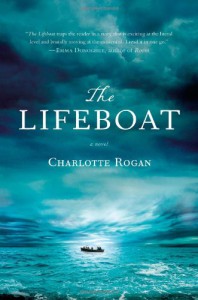 “I wondered if all a person could hope for was illusion and luck, for I was forced to conclude that the world was fundamentally and appallingly dangerous. It is a lesson I will never forget.”
“I wondered if all a person could hope for was illusion and luck, for I was forced to conclude that the world was fundamentally and appallingly dangerous. It is a lesson I will never forget.”"The Lifeboat" by Charlotte Rogan is a book about basic human nature, and the things we are willing to sacrifice in order to stay alive. The contrast between nature and culture, civilization and isolation is central to this novel. Rogan explores the social structures and power struggles that can arise in an isolated environment where the main rule is 'survival of the fittest'. In fact, this story takes us back to the raw, brutal and simplistic primal forces that lies within us all.
While this most certainly is an interesting topic, it has been written many times before with much more insight and depth. I would rather pick Golding's "Lord of the Flies" up again than read this. Rogan adds nothing new to her subject, she uses an absurd amount of pages on something we've all heard before, and she comes to no conclusion at all. A book with such a strong topic ought to make an impact on you. But this really didn't at all.
The book has no building suspense, no unpredictability and it keeps repeating the same pattern over and over and over again. Mr. Hardie's brutal strength is dwelled upon several times, his personality is constantly contrasted with Mrs. Grant's moral compass, and the eventual power struggle between those two characters is inevitable.
Whenever a character died or was murdered, I felt nothing at all. Rogan's characters leaves no impression on the reader, they are faceless inventions and they can't really be separated from each other. The result is a mere 'oh well' every time something dramatic concurs.
For a while I thought the book would take an uexpected turn in the style of Martel's "Life of Pi", but it never did. It ended as weak and timidly as it began, and that was it. No symbolic complexity, no profound conclusion. Just an ending with a sure guarantee of everlasting oblivion.
 One day I found a picture of this book on Tumblr. I saw the beautiful illustrations and the mysterious title, and I knew it. I knew I had to read it. I quickly found a synopsis of its plot, praise for its author and comparisons towards Roald Dahl and the Harry Potter books. I didn't doubt it for a second; I ordered it without giving it any thought.
One day I found a picture of this book on Tumblr. I saw the beautiful illustrations and the mysterious title, and I knew it. I knew I had to read it. I quickly found a synopsis of its plot, praise for its author and comparisons towards Roald Dahl and the Harry Potter books. I didn't doubt it for a second; I ordered it without giving it any thought. And then it arrived, looking so shiny and new with the flawless scent of untouched pages and freshly published letters. I was astonished at its length at first, but then I flipped through it and delighted in the gorgeous chapter illustrations and pencil-drawn details. I knew it was going to be good - so I saved it for a while, put it on my summer-to-read-list and looked forward to reading it. It stood on my shelf, waiting to be opened, to be read, to be loved. And yesterday I finally picked it up.
I shouldn't have taken it out of my bookcase. I shouldn't have crumbled its pages. I shouldn't have bought it or even looked forward to it at all. It was disappointing, repetitive, meaningless and way too long. In the end, all of my expectations amounted to nothing at all.
“What is life without laughter?”
The writing style let me down. I was expecting something in the style of Roald Dahl's absurdity, Daniel Handler's ramblings or perhaps even Neil Gaiman's strangeness. But no. "The Mysterious Benedict Society" was written without any peculiarity or childish fondness. The sentences mostly consisted of statements rather than feelings.
And while I did enjoy the whimsical atmosphere of the children's many trials at first, they were repeated in a most tiring manner. First the children try out for school, then they move to another school and try to get promoted to the elite, and then they try to solve a mystery. They face tests after tests after tests. And I got bored.
Perhaps it was because I entirely had misunderstood the premise of the book; I thought it was going to be about an interesting boarding school, not a detective-story in the manner of Enid Blyton's "The Famous Five". The story started in a lovely way, but got stretched and blown out of proportions - the novel is too long for its own good. The mystery in "The Mysterious Benedict Society" won't keep you up at night; rather it will lull you to sleep, and let you drift away into a world of dreams. If only Stewart had let his characters speak more - and investigate less.
“They stared out their window at night enough to know where the darkest shadows lay, and it was to the darkest shadows they kept.”
I quite liked the characters, especially the stubborn Constance won my heart, and it pained me to see the group treat her as a burden. Stewart's ultimate message about friendship, family and belonging is very sweet and heartwarming - but it could have been told in a more entertaining and lighthearted manner. I would gladly have skipped the last 300 pages of this book.
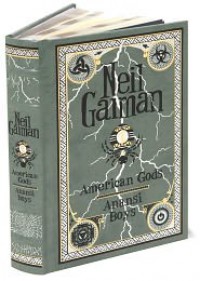 First of all; this edition is gorgeous - and filled with lovely details. With richly illustrated endpapers, shiny silver edges, a ribbon silk bookmark and a very symbolic cover design, it is a treasure for every Neil Gaiman fan and every admirer of beautiful books in general. I am so happy to display it on my shelf.
First of all; this edition is gorgeous - and filled with lovely details. With richly illustrated endpapers, shiny silver edges, a ribbon silk bookmark and a very symbolic cover design, it is a treasure for every Neil Gaiman fan and every admirer of beautiful books in general. I am so happy to display it on my shelf.Of course the two novels it contains are gorgeously crafted as well. Neil Gaiman truly is a wizard, and every word he writes is filled with magic. I especially like how these two novels correspond to one another, without being directly intertwined at all. "American Gods" draws its reader into a wondrous world of mythology and belief, while "Anansi Boys" focuses solely one aspect of that world. Perhaps it is best (and most correct) to read "American Gods" first; but in my opinion it definitely would be possible to start with "Anansi Boys" as well.
I recently read "American Gods" (You can read my review here), and it left me puzzled, dazzled and confused at its complexity. I never fully grasped the many strings of Gaimans tightly woven storyline, and I will need to reread it carefully and with undivided attention another time.
"American Gods" left me undecided, so I postponed "Anansi Boys" for a couple of weeks. I wasn't expecting a lot from it - and what a foolish mistake! "Anansi Boys" turned out to be completely and utterly mesmerizing, a page-turner, a quick, fun and beautiful read. I was dragged into one of Anansi's stories, left in his glittering spider web, and caught in a cocoon of dark strangeness. My heart ached for Fat Charlie, I sent blaming glances at Spider, and I was in awe of another, even curiouser, world of Gods, religion and myth.
The story is witty, it is fun and it is endlessly charming. Gaiman's imagery never fails, and I loved the idea of someone being divided into two halves of a whole. The additional starfish-growth was hinted long before I even realized what was going on - which is such a typical trick of both Anansi and Gaiman himself. It is in fact quite fitting that Gaiman chose to examine the God of stories, of tales, of words and of trickery - because he himself is such a God.
“Stories are like spiders, with all they long legs, and stories are like spiderwebs, which man gets himself all tangled up in but which look pretty when you see them under a leaf in the morning dew, and in the elegant way that they connect to one another, each to each.” - Neil Gaiman, "Anansi Boys"
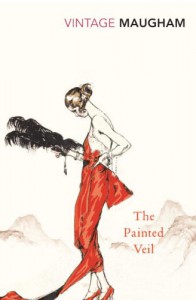 “How can I be reasonable? To me our love was everything and you were my whole life. It is not very pleasant to realize that to you it was only an episode.”
“How can I be reasonable? To me our love was everything and you were my whole life. It is not very pleasant to realize that to you it was only an episode.”With "The Painted Veil" Maugham presents an intricate study of isolation, appreciation, religion and foreign ways. He also creates a tale of the utter despair and destruction that is love. A story with an abundance of layers, symbols and ethics hidden beneath the most simple language imaginable. Quite an achievement.
Walter is perhaps my favorite person in this novel. Not because he is particularly likable or reasonable - but because he is blinded by love, self-destructing and unconditional love. He cannot bear to lose his Kitty without losing himself as well. I liked the dramatic scenes of confrontation between him and Kitty, and I loved the accompanying scent of vague madness. A lot of this does however hide between the lines, as Walter is repressing every single emotion, and does not allow himself to speak.
Kitty was a bit harder for me to like. Her character is perfectly understandable and well-known, but it doesn't really come to life. She is forever torn between passion and appreciation, lust and duty, and even though she did develop a sweet fascination for religion, she never really managed to see herself clearly.
And this is another critique of the plot: the religious parts felt odd, misplaced and a bit insincere. Most of all, it felt like filling rather than meaning; Kitty could easily have found her conclusion in the seclusion alone.
I also feel like Kitty is living in such a fascinating landscape with death, drama and life raging on around her. I wish Maugham had explored the surroundings more.
“She did not know why it seemed to her so tragic to cry in her sleep.”
I am torn, and I am impressed. Maugham's discreet critisicm of women's education and his forceful love example is extraordinarily written. With its many hidden motives and vivid symbolism, this book is quite a gem. The theme is lovely - but the characters and some parts of the plot are not really anything worth speaking about, at all.
I am soon going to watch the movie, and for that I am excited. It looks beautiful.
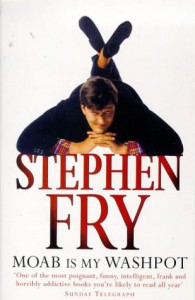 I adore Stephen Fry. Obviously. His personality burns through everything he does, he is exceptionally charismatic, well-spoken and charming. But I have never really engaged with his writing until now.
I adore Stephen Fry. Obviously. His personality burns through everything he does, he is exceptionally charismatic, well-spoken and charming. But I have never really engaged with his writing until now. A few months ago I accidently stumbled upon his beautiful essay "Have You Ever Heard of Oscar Wilde" in The Library Book, and I was amazed by Fry's wit and elegant writing. Soon I wanted to know more of this extraordinary man and his way with words. With a little help from a dear friend of mine, I decided to start with "Moab is My Washpot" - which is not only my first book by Stephen Fry, it is also my very first attempt at reading an autobiography.
It turned out as a delightful experiment. Because this is not only a collection of memories; it is an analysis, a reflection on childhood and the experiences that has shaped Fry as a human being. It is filled with regret, mind-wanderings, distractions, fictional names and several musings on art, music and literature.
Fry colors every little page with his bittersweet reminiscence of his happy parents, beautiful childhood surroundings and inner struggles. He is brutally honest, and when you're done reading "Moab is My Washpot" you may feel like, you have caught a private glimpse of his deepest thoughts.
I couldn't have imagined a better introduction to autobiographies. Perhaps I should grab "The Fry Chronicles" next.
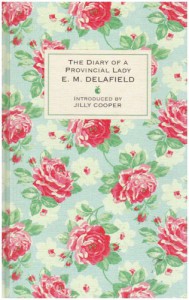 “Feel that life is wholly endurable, and decide madly to get a new hat.”
“Feel that life is wholly endurable, and decide madly to get a new hat.” An amusing glimpse into the diary of a very simpleminded and clumsy Provincial Lady, her careless and grumbly husband Robert, her too truthful children and her hopelessly pretending neighborhood. It reads almost like a forerunner to "Bridget Jones' Diary" with its endearing scenes of everydaylife, not-too-practical musings on personal economy and unlucky efforts to dye one's hair.
The book is composed of simple and short sentences - which can be tiring at times, but generally feels very convincing. The fact is, this does seem like a diary, someone would keep; it is not filled with pompous musings and elegant language - but it is perfectly believable. Filled with little memos and random wonderings, "The Diary of a Provincial Lady" almost feels like a personal notebook.
I adored the many literary references, and laughed wholeheartedly at the Provincial Lady and her literary aspirations. In fact, the entire novel is buzzing with books people read (or pretend to read) in order to seem intellectual and cultural enough. The book of the month that nobody reads and everybody hates, the narrator's desperate wish to love Keats, and the many acquaintances of authors and artists are perfect examples of literary snobberies.
But beneath the many satiric layers of country-life lies a feministic worldview and a delicately executed criticism. Lady Boxe almost reminded me of Austen's Lady Catherine de Burgh, and Delafield does indeed possess that particular Austenesque sense of comical personalities.
“She is never alone when she has Her Books. Books, to her, are Friends. Give her Shakespeare or Jane Austen, Meredith or Hardy, and she is Lost - lost in a world of her own. She sleeps so little that most of her nights are spent reading.”
 I adore the premise of this book. It is a rare thing to come by a chick-lit novel that is capable of predictable entertainment and heavy speculations. "My Best Friend's Girl" is a beautiful story of moral dilemmas, forgiveness, grief, guilt, death, loss and love. It is about coming to terms with buried demons and facing the reality head-on. At its very core, "My Best Friend's Girl" is an optimistic tale of how to heal the past and truly live in the present.
I adore the premise of this book. It is a rare thing to come by a chick-lit novel that is capable of predictable entertainment and heavy speculations. "My Best Friend's Girl" is a beautiful story of moral dilemmas, forgiveness, grief, guilt, death, loss and love. It is about coming to terms with buried demons and facing the reality head-on. At its very core, "My Best Friend's Girl" is an optimistic tale of how to heal the past and truly live in the present. However, some parts of the book were poorly executed. While Koomson's has a delightful way of writing, I do not think she is particularly skilled at characterization. The characters start out as rock-solid personalities, and end up with blurried edges. Holes appear because the characters do not act within their own sense of reason - and the plot suffers from it.
The most obvious example is Luke. Koomson goes out of her way to draw a picture of a lovable, tender and fragile man in the beginning, and then forgets everything about him when Nate shows up. There is not one loving scene between Luke and Kamryn while Nate is in the picture; Koomson neglects her own character, she leaves him out of the equation in order to create some sort of sympathy towards Nate. It is too obvious to abandon and dismiss Luke so easily.
And then there's the rushed ending. For Kamryn to suddenly open her arms like that without any questioning feels wrong and hurried. You would think a person like Kamryn would be extremely cautious, at best.
Love triangle aside, this is a promising book with a lot of potential. I love what Koomson has done with the well-known chick-lit genre. I like that "My Best Friend's Girl" feels substantial, thought-provoking even. I like that it lingers.




